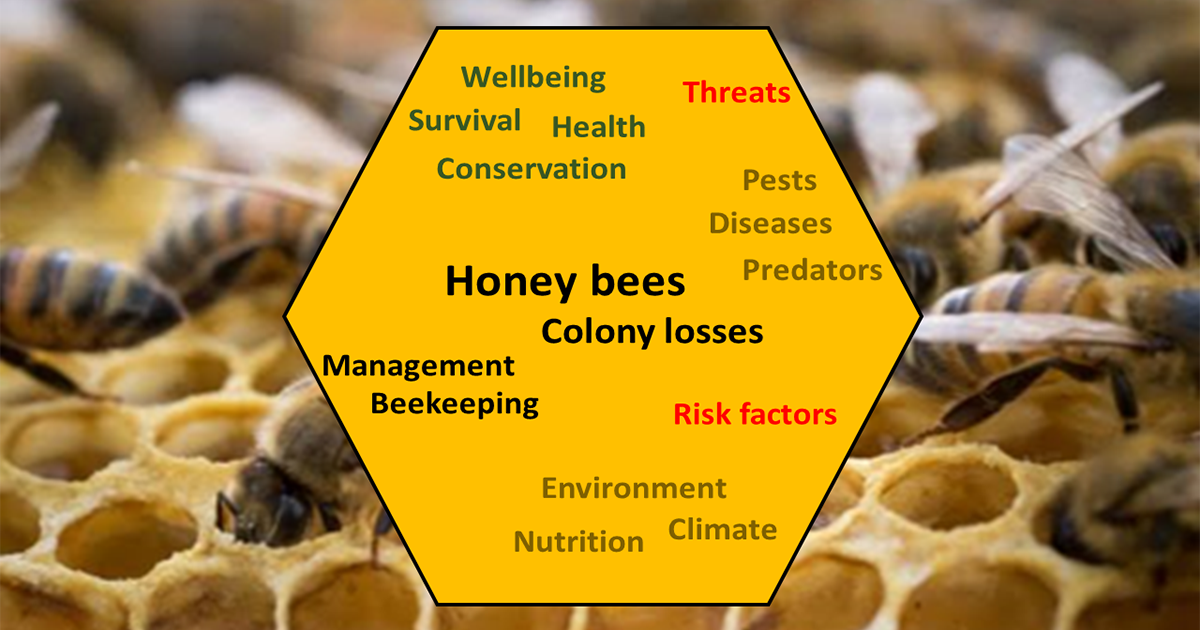- 2.9Impact Factor
- 5.6CiteScore
- 19 daysTime to First Decision
Losses, Health and Wellbeing of Honey Bees Across the World
This special issue belongs to the section “Insect Ecology, Diversity and Conservation“.
Special Issue Information
Dear Colleagues,
Following the earlier successful Special Issue "Losses of Honey Bee Colonies across the World", and in view of the importance of this topic and the continuing interest and research in this area, we are pleased to launch a second Special Issue, on “Losses, Health and Wellbeing of Honey Bees Across the World”. We welcome further high-quality articles on any aspect of honey bee wellbeing, including, for example, national, regional and international colony losses, colony monitoring generally, modelling of survival, results of surveys, risk factors, established and emerging threats and their control, effects of environment and climate, survival of feral colonies, resistance to pests and disease, management, conservation and sustainability. Observational studies, laboratory studies and field studies could all be relevant.
Colleagues are warmly invited to submit original research, reviews and other suitable types of articles within the scope of this Special Issue.
Dr. Alison Gray
Guest Editor
Manuscript Submission Information
Manuscripts should be submitted online at www.mdpi.com by registering and logging in to this website. Once you are registered, click here to go to the submission form. Manuscripts can be submitted until the deadline. All submissions that pass pre-check are peer-reviewed. Accepted papers will be published continuously in the journal (as soon as accepted) and will be listed together on the special issue website. Research articles, review articles as well as short communications are invited. For planned papers, a title and short abstract (about 250 words) can be sent to the Editorial Office for assessment.
Submitted manuscripts should not have been published previously, nor be under consideration for publication elsewhere (except conference proceedings papers). All manuscripts are thoroughly refereed through a single-blind peer-review process. A guide for authors and other relevant information for submission of manuscripts is available on the Instructions for Authors page. Insects is an international peer-reviewed open access monthly journal published by MDPI.
Please visit the Instructions for Authors page before submitting a manuscript. The Article Processing Charge (APC) for publication in this open access journal is 2600 CHF (Swiss Francs). Submitted papers should be well formatted and use good English. Authors may use MDPI's English editing service prior to publication or during author revisions.
Keywords
- honey bees
- beekeeping
- colony losses
- survival
- health
- wellbeing
- management
- environment
- climate
- threats
- conservation

Benefits of Publishing in a Special Issue
- Ease of navigation: Grouping papers by topic helps scholars navigate broad scope journals more efficiently.
- Greater discoverability: Special Issues support the reach and impact of scientific research. Articles in Special Issues are more discoverable and cited more frequently.
- Expansion of research network: Special Issues facilitate connections among authors, fostering scientific collaborations.
- External promotion: Articles in Special Issues are often promoted through the journal's social media, increasing their visibility.
- e-Book format: Special Issues with more than 10 articles can be published as dedicated e-books, ensuring wide and rapid dissemination.
Related Special Issues
- Losses of Honey Bee Colonies across the WorldinInsects (10 articles)

